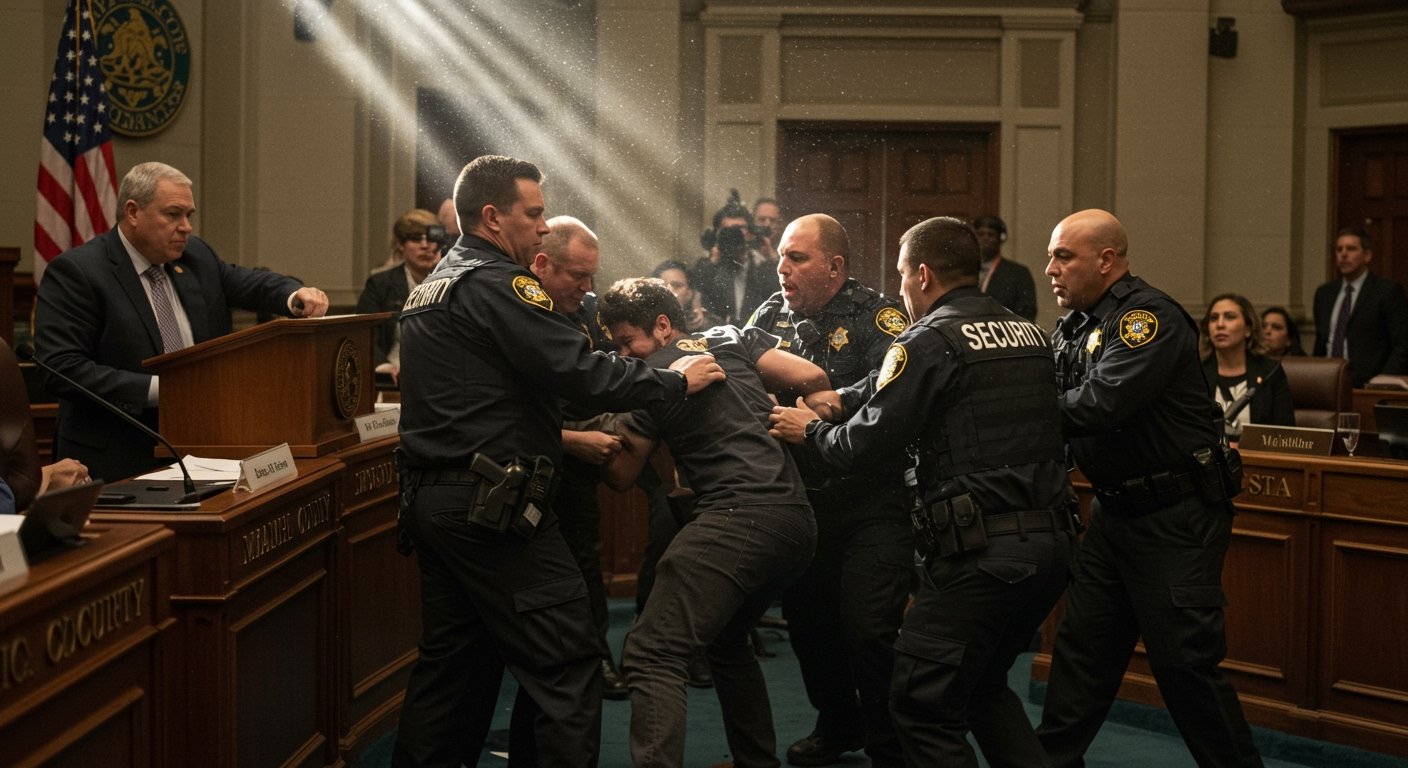MIAMI – A routine session of the Miami-Dade Commission devolved into unexpected disarray on June 26, 2025, when a public objector to a proposed agreement concerning federal immigration detention facilities was forcibly removed by security personnel. The incident underscored the often-tense intersection of local governance and national policy, particularly regarding immigration.
The chaotic scene unfolded during a critical discussion item on the commission’s agenda: a potential new agreement with Immigration and Customs Enforcement (ICE) regarding the housing of detainees. Such agreements, often related to intergovernmental service agreements (IGSAs), allow federal agencies to utilize local or county jail facilities for temporary detention, typically involving financial compensation to the local jurisdiction.
The Commission Meeting and the Contested Agreement
The Miami-Dade Commission, the governing body responsible for setting policy and overseeing county administration, was gathered in its chambers for its scheduled meeting. Among the numerous items slated for consideration was the proposed pact with ICE. While the specific details of the agreement being debated on June 26, 2025, were not immediately made public, the nature of such contracts frequently involves commitments related to capacity, standards of care, and financial terms for housing ICE detainees within county facilities.
Public comment periods are a standard component of commission meetings, providing residents and interested parties an opportunity to voice their opinions on agenda items. These periods are intended to facilitate transparency and allow for citizen input into the decision-making process. However, they can occasionally become flashpoints for protest, particularly on contentious issues.
Escalation Leading to Removal
According to eyewitness accounts and limited official statements following the event on June 26, 2025, an individual rose to speak during the public comment portion specifically concerning the new agreement with ICE. Their remarks reportedly grew increasingly impassioned as they expressed strong objections to the proposed partnership.
The exact nature of the objection was not immediately clear, but opposition to such agreements often centers on concerns about civil liberties, conditions within detention facilities, the morality of participating in federal immigration enforcement, or the potential impact on local community relations. The objector’s comments reportedly became disruptive, potentially exceeding the time limits allocated for public address or including remarks deemed out of order by the presiding commissioner.
As the disruption escalated, efforts were made by commission staff or security to restore order. When the individual reportedly refused to cease their protest or comply with requests to leave the podium or the chambers, law enforcement officers present at the meeting were called upon to intervene. This intervention led to the physical removal of the individual from the commission chambers.
Multiple sources indicated that the removal was forceful. Descriptions used included that officers “dragged out” the objector, a term that suggests significant physical resistance or the use of force necessary to overcome it. The act of physically removing a speaker from a public meeting, especially by force, is an uncommon occurrence and immediately injected an element of chaos into the proceedings.
Aftermath and Implications
The sudden and forceful removal momentarily halted the commission’s proceedings. The disruption served as a stark visual representation of the deep divisions and strong feelings that issues related to immigration policy and enforcement can provoke at the local level. While the meeting eventually resumed, the incident left a palpable tension in the chamber.
The event on June 26, 2025, highlights the delicate balance local governments must strike when navigating complex federal mandates and policies, particularly those that intersect with sensitive social and political issues like immigration. Agreements concerning ICE facilities are often controversial, drawing scrutiny from civil rights advocates, community organizations, and residents concerned about the treatment of detainees and the county’s role in the federal immigration system.
The objector’s dramatic removal, while disruptive, also drew attention to the specific agenda item – the new agreement concerning ICE jails – ensuring it did not pass without significant public notice, albeit in a tumultuous manner. Such incidents raise questions about the protocols for managing public dissent in official settings and the extent to which disruptions can be tolerated before security intervention is deemed necessary.
Investigations or reviews into the specifics of the removal process may follow, depending on the policies of the Miami-Dade Commission and local law enforcement. The incident on June 26, 2025, is likely to remain a point of discussion regarding the public’s right to protest and the measures taken to maintain order during government proceedings as Miami-Dade County continues to grapple with its relationship with federal immigration authorities.





